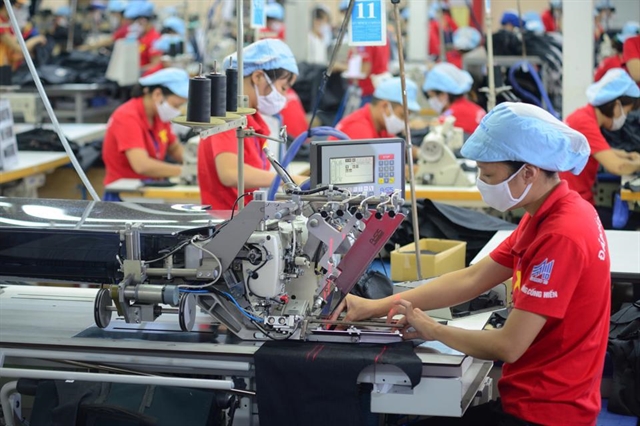 Economy
Economy


|
| Workers at the Garment 10 JSC. Experts believe that the world and domestic economic situation in 2024 will continue to have difficulties and challenges. — Photo kinhtedothi.vn |
HÀ NỘI — Experts believe that the world and domestic economic situation in 2024 will continue to have difficulties and challenges. In that context, Vietnamese businesses need to proactively implement solutions to promote production and sales.
Looking at the market outlook for 2024, experts have pointed out two issues. First, some export industries have good signals because they have exhausted foreign inventories, but some other industries are still facing difficulties due to consumers tightening their spending. Second, some foreign importers have moved to other markets that are better than Việt Nam.
Regarding this issue, Deputy Director of the Import-Export Department of the Ministry of Industry and Trade Trần Thanh Hải recommended that local businesses carefully consider and adjust their business strategies by returning to the domestic market and wait for a big boost in purchasing power so domestic manufacturers can boost production.
Regarding exports, currently 70 per cent of businesses have changed their strategies and have had many orders. For example, the fruit and vegetable industry has set an export record because it changed strategies.
In 2024, Việt Nam has many sources of plastic raw materials due to many FDI (foreign direct investment) enterprises invested in this field. Therefore, Vietnamese businesses can take advantage of this source of raw materials to reinvest in production instead of importing raw materials.
In addition, there are still some industries that are lagging behind, such as seafood and electronics, which still depend on FDI.
Director of the Centre for WTO and Integration (VCCI) Nguyễn Thị Thu Trang suggested that Vietnamese associations and enterprises should focus on engagement programmes to orient businesses towards sustainable development, and development associated with the requirements, procedures and regulations of developed countries such as CO2 emissions, renewable energy, and products that use high technology and use less labour.
In particular, it is necessary to invest in smart factories and improve domestic products' quality to be on par with exports. At the same time, there needs to be communication about trade promotion programmes for businesses covering all provinces and cities nationwide. In addition, the State needs to support and advise on financial policies so that local businesses can quickly grasp, implement properly and prepare both economic and human resources, according to Trang.
“Regarding the outlook for 2024, I predict that the domestic macro economy will maintain stable growth, inflation will be controlled, and promoting public investment will be the premise for the stable development of industries. In particular, in 2024, the Government will still focus on prioritising development in three main areas, including production, exports and domestic consumer services. In particular, agriculture is still used as support to promote sustainable processing,” said economic expert Nguyễn Trí Hiếu.
Maintaining a stable growth rate in the current context is considered a positive result, helping local enterprises hope for strong business prosperity in 2024.
At this time, most businesses have been making efforts to prepare production and sales plans for Tết (Lunar New Year) goods. Even though the general situation is difficult and consumer spending is still weak, businesses have predicted the situation, proactively coordinated raw material sources and produced to ensure enough goods for people during the upcoming Tết period.
Chairwoman of HCM City Food Association Lý Kim Chi said: “Việt Nam currently has signed cooperation agreements with many regions through free trade agreements (FTAs). Enterprises in the food industry are gradually taking advantage and promoting export turnover to increasingly prosperous markets.”
This shows that new-generation FTAs have been opening up a large market for Vietnamese businesses. Not only that, these agreements have contributed to helping Vietnamese businesses make major changes in quality, because these are markets with very high and strict quality requirements, according to Chi.
“Việt Nam's key products are facing competition from countries like India and Thailand right at home. This requires businesses to innovate, change technology, digitally transform, trace product origins, improve labour productivity, increase product value and maintain the domestic market as well as adapt to requirements from export markets," stressed Chi.
Based on the prospect of a world economic recovery and forecasts of Việt Nam's economic situation, the Vietnam Textile and Apparel Association (VITAS) has set a target of textile export turnover in 2024 reaching US$44 billion, an increase of 9.2 per cent compared to 2023. Currently, many businesses have enough orders for the first quarter of 2024 and the situation will likely improve in the second quarter of 2024 when the US Federal Reserve cuts interest rates to support businesses to recover.
Vice President of Vietnam Textile and Apparel Association (VITAS) Trần Như Tùng said: “In 2024, to achieve the set goal, VITAS suggested the State soon deploy a package of VNĐ120 trillion with preferential interest rates for construction of social housing and worker housing as well as continue to support businesses with funding to train and improve vocational skills for workers, especially for difficult-to-train professions such as textile engineers, dyeing and design engineers, and technological innovation, green and digital transformation skills.” — VNS




